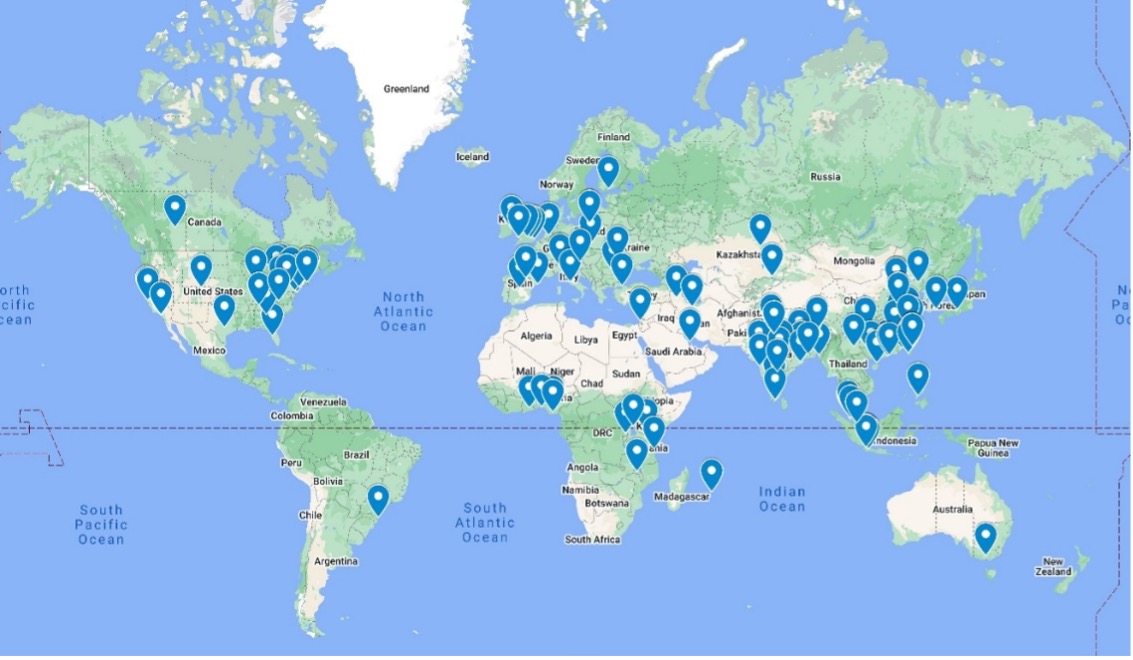Stanford Center on Longevity Announces Finalists for 10th Annual Design Challenge
“Optimizing Health Span: Living Well at Every Age”
The Stanford Center on Longevity is pleased to announce 8 Finalist teams for the 2023 Longevity Design Challenge. These Finalists were selected from 241 submissions received from 38 different countries. The Challenge is open to teams from any accredited university in the world.

Map of Stanford Center on Longevity Design Challenge 2022-2023 Submissions
This year, the Challenge is celebrating its tenth anniversary. Over the past decade, over 870 teams representing 66 countries have entered the competition. During that time, multiple Finalists have gone on to create successful businesses based on their designs.
The goal of the Challenge is to encourage student designers to innovate for our increasingly longer lives. The 2023 challenge to design for “Optimizing Health Span” was inspired by the Center on Longevity’s New Map of Life initiative, which seeks to build a society that better supports century-long lives. A key challenge of longer life is to ensure that added years are healthy years. Students were invited to create solutions that help people remain healthy, mobile, and mentally sharp at any age.
“As life spans increase, we don’t want people spending more time in ill health. We want them to build healthy lives in childhood and maintain that good health throughout life,” commented Marie Conley-Smith, who coordinates the Challenge. “It’s fantastic news that so many students around the world were inspired to innovate around this issue.”
Finalists were selected by a panel of 35 expert judges drawn from industry, academia, and non-profit foundations. Finalist teams will be awarded $1,000 and will travel to Stanford University compete for a $10,000 first prize in the finals, which will be held in Paul Brest Hall on April 25, 2023.
This year’s finalists are (in alphabetical order):
2 Care (Tunghai University, Ming Chi University of Technology, and National Taipei University of Education, Taiwan) – A tool for monitoring periodontal health.
Fitness & Fun Facility (Beijing Institute of Technology, China) – Public fitness equipment designed for use by grandparents and grandchildren together.
PaperRoad (Carnegie Mellon University, USA) – An AI-powered wellness platform for teens targeting mental health.
Shakti (UC Davis, USA) – An app that detects, educates, and monitors the problem of anemia and IFA intake in pregnant women.
Sonura (University of Pennsylvania, USA) – An auditory system for NICU babies that mimics the womb environment and uses parental audio messages to promote healthy development.
Tree of Life (NMIMS School of Design, India) – A board game that helps people understand the cognitive changes associated with healthy aging and the steps they can take to maintain cognitive health.
Unpause Life (NMIMS School of Design, India) – An informational and hormone-testing kit for menopause.
Variable Reactive Board (New York University and Pratt Institute, USA) – A mechanically actuated balance training device.
About the Challenge
The Stanford Center on Longevity Design Challenge is a global competition aimed at encouraging students to design products and services to improve the lives of people across all ages. Established in 2013, the Challenge is focused on ways to motivate and empower people in their daily lives both inside their homes and in their community.
The challenge is made possible by generous sponsorship from a number of companies and foundations, including, Target, Honda Motor Company, Finance of America Reverse, Procter and Gamble, Eskaton, Halbert Hargrove, Odyssey Group Coaching LLC, and Tushara Dilanie Canekeratne.
